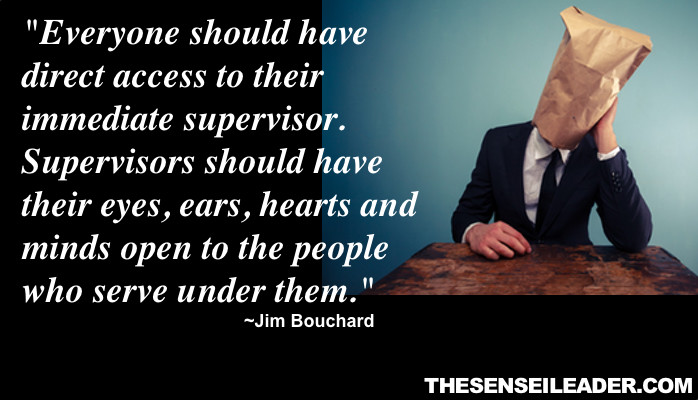
Don’t be an “Undercover Boss!”
Remember that in terms of sheer volume, most of the practical knowledge and intellectual capital in any organization exists in the ranks, not in the highest positions.
Most important information about current conditions originates on the front lines, too— those people are on the point. They’re your connection to the entire organization and to the outside world. This is one of the many reasons it’s important to become a skilled and receptive listener. You’ve also got to cultivate a process that facilitates the clear and timely flow of information back and forth through all levels. To do this, you’ve got to encourage leaders at all levels and support those people who are willing to communicate openly and honestly.
“Do you like the TV show, Undercover Boss?”
I ask that question nearly every time I do a SENSEI LEADER presentation. At this point, most of the people in the room start sharing anecdotes from their favorite episodes—it seems most business folks love the show.
“I hate it!”
When I say that, the room usually goes dead silent. How can I hate such an entertaining and informative program? It has nothing to do with the quality of the
show and I admit I do get sucked into it from time to time, but still—it drives me up a wall––why? Because I can’t understand how the hell so many top CEOs are so surprised to learn about how their people feel on the front lines! They shouldn’t be!
Their ignorance is inevitably a direct result of a lack of two-way communication. In the spirit of full disclosure, I’ve always been a micro-business guy. I’ve never run a huge corporation. I’ve never had more than a couple of employees at a time. Like most small business operators, I work shoulder to shoulder with everyone in my organization. I can’t help but see and hear most everything, even things they’d probably rather I didn’t! How can I possibly expect the CEO of a large organization of a thousand or more people to sit down and engage every single employee in the organization on that same level? I don’t. I do suggest you engage some of them on regular basis—if you want them to be engaged in your mission.
Sam Walton built the largest retail empire on earth by engaging all of his employees on a very personal level.
While he was still running the company, he mandated that everyone in management spend time each year on the front lines.
This remarkable policy put top executives and managers shoulder to shoulder with the people on the front lines. He put managers and executives in positions where they would experience life in the trenches first hand and, even more important, where they could hear the voices of the people on the ground who really make the company work.
I realize that if you’re the CEO of an organization with 10,000 employees, it’s just impossible to sit down with each and every one of them individually, but here’s what you can do:
- You can dedicate time to spend with a few of them on a regular basis.
- You can build a culture of sincere interest.
- You can insist that supervisors spend time understanding the needs, desires and motivations of the people directly in their care.
Everyone should have direct access to their immediate supervisor. Supervisors should have their eyes, ears, hearts and minds open to the people who serve under them.
You don’t need to disguise yourself on a reality show to connect with the troops!

Value-added coach, aligning your value to justify your price.
8yJim: I once worked for a business unit manager that rarely left his office and hated visiting customers. I guess you know where that business ended up. Great post.